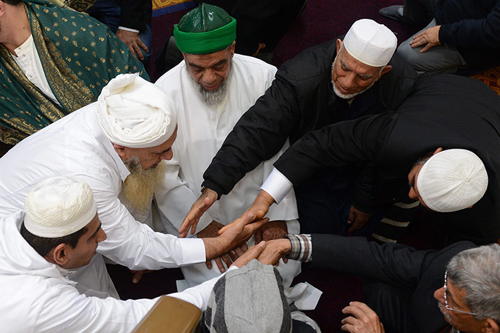Islam did not invent the idea of fasting, which was once a major ritual in both Judaism and Christianity. One might argue that contemporary Catholic Lent is a watered-down version, playing fast and loose with the more rigorous traditions of the past. In Islam fasting is one of the so-called five pillars, a ritual that most Muslims believe is essential for the believer. The Quran is quite clear on this:
Ramadan is the (month) in which was sent down the Qur’an, as a guide to mankind, also clear (Signs) for guidance and judgment (Between right and wrong). So every one of you who is present (at his home) during that month should spend it in fasting, but if any one is ill, or on a journey, the prescribed period (Should be made up) by days later. Allah intends every facility for you; He does not want to put to difficulties. (He wants you) to complete the prescribed period, and to glorify Him in that He has guided you; and perchance ye will be grateful. (Qur’an 2:185)
The fact that there are exceptions (while traveling, women who are pregnant or breastfeeding or menstruating, taking necessary medicine, etc.) indicates that there has always been flexibility built into the ritual. In these cases the rule is that the fast be made up at another time in the year. Some individuals (a child before puberty, or someone who is insane or even a person who has a terminal illness) are not obliged to fast at all, nor to make up any fasting days.
But how much flexibility? What if a Muslim chooses not to fast for a reason other than those laid out in centuries of Islamic fiqh? The issue then arises of whether or not a Muslim who does not fast should be persecuted, beaten or arrested. There are ways in which penance can be made for deliberately violating the fast.
There are many Muslims who do not rigorously observe fasting, nor follow all the rules to the letter of medieval law, but still reserve the right to practice their faith. Lost in the legalism is consideration of why one should fast at all. Is it really the case that the purpose is simply to conform to a rule? Reading between the legalistic lines, it should be clear that intention plays a major role. The “best” Muslim may be the one who follows the rules to the best of his or her ability and is also an upright, caring and loving person; ritual duty blends with the proper moral intention. But who is a “better” Muslim? One who is thankful, not greedy, helps out the poor and chooses not to fast by all the rules or one who is meticulous in following the rules but is greedy, unthankful and cheats his or her neighbor?
My point is not to speak against fasting in Ramadan, which millions of Muslims find spiritually as well as physically rewarding when done for the right reasons. But, as many Muslim clerics have noted, the spirit of Ramadan is not served when it is commercialized or devoid of spiritual jihad, just as Christmas can become little more than tinsel and glitter if not a time to reflect on the moral principles that Jesus proposed. So, if your brother or sister decides not to fast, this is not your problem, nor are you the best judge of that person’s faith. When the urge arise to punish another, just remember “not so fast.” »»» tabsir.net
Go to article…



